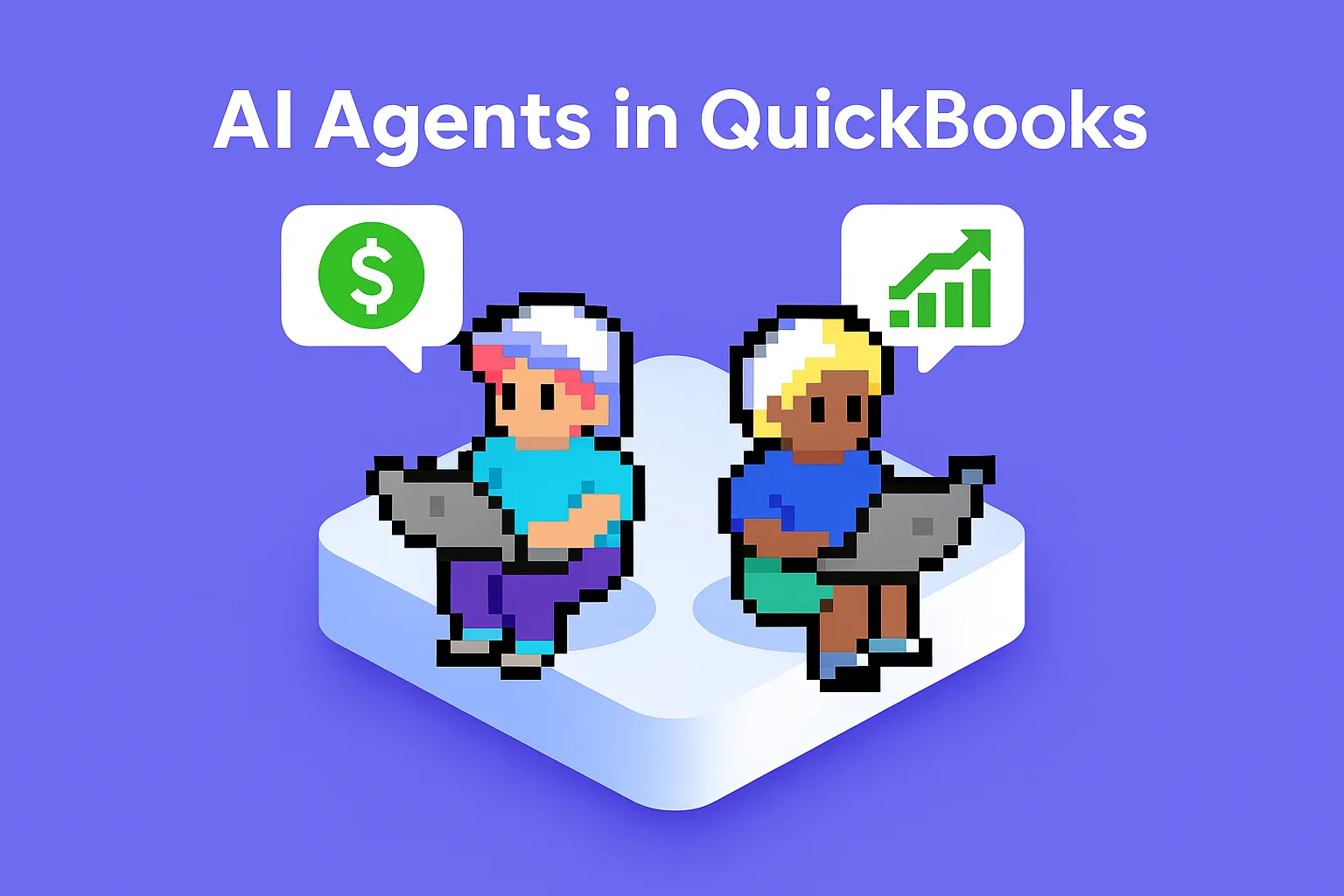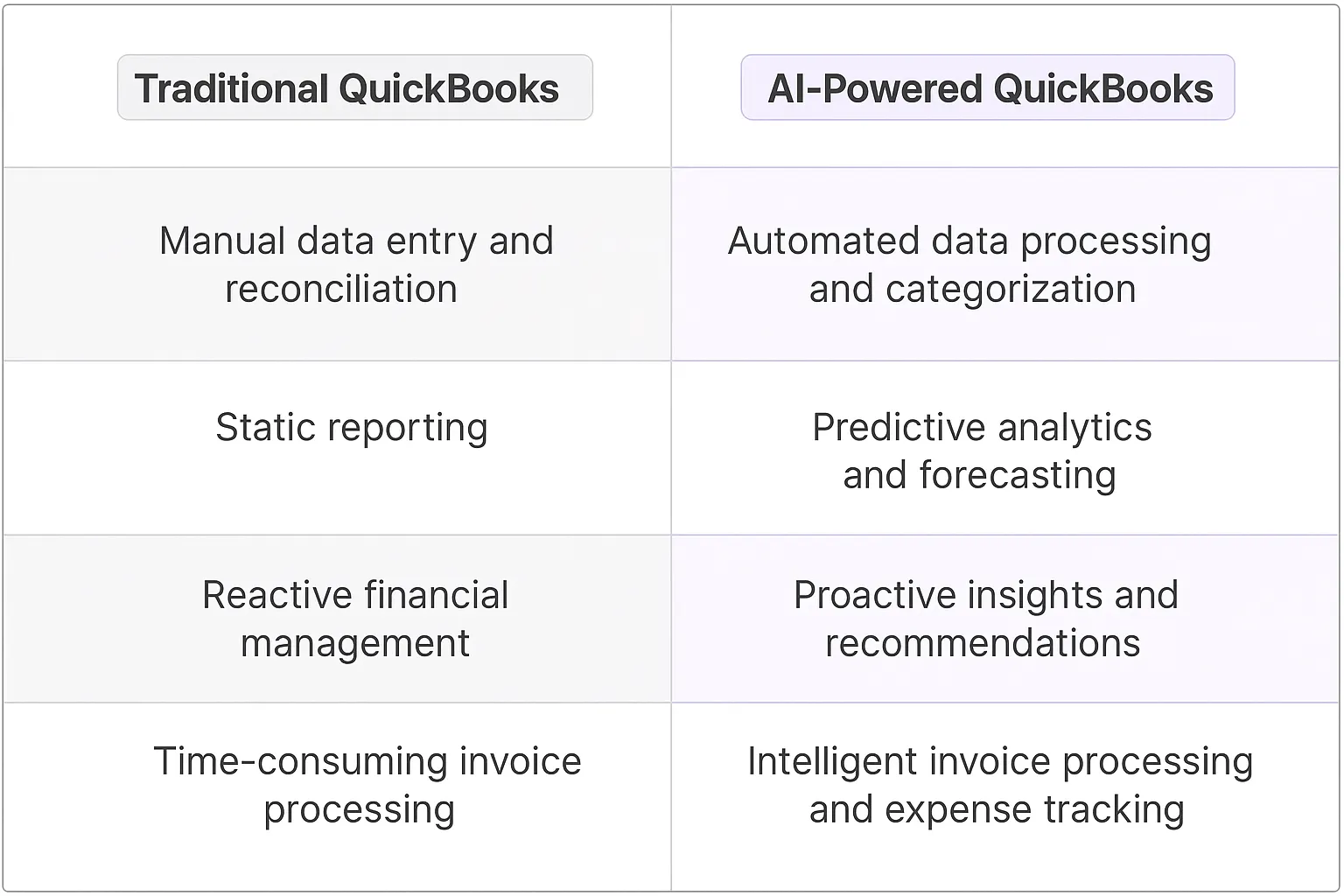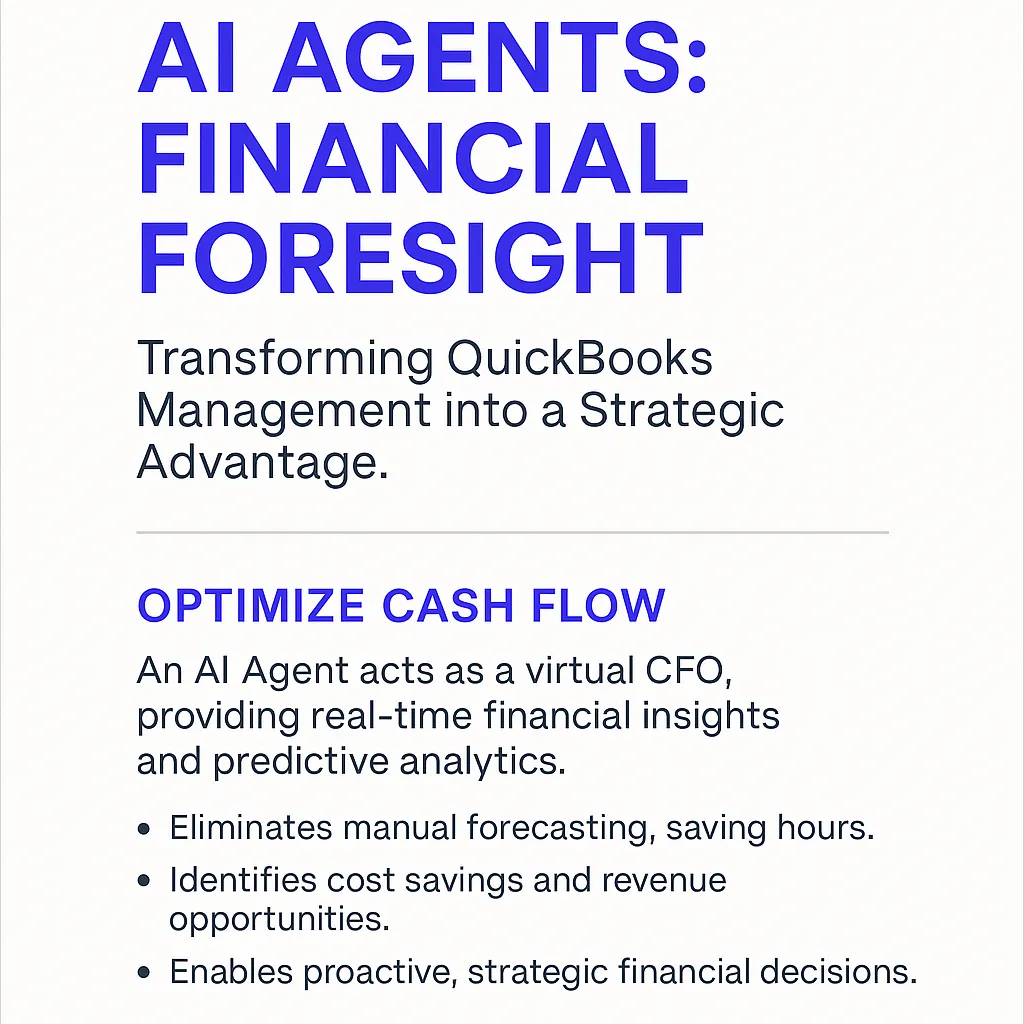Quickbooks AI Agents
Understanding QuickBooks
QuickBooks is the heavyweight champion of small business accounting software. It's the go-to financial management tool for millions of businesses worldwide, offering a robust platform for tracking income and expenses, managing invoices, and generating financial reports. But QuickBooks isn't just a glorified spreadsheet - it's a comprehensive ecosystem that can handle everything from payroll to inventory management.
QuickBooks packs a punch with its feature set. You've got real-time cash flow management that gives you a bird's eye view of your financial health. There's automated invoicing that turns you into a collections ninja. The software also offers bank reconciliation that's smoother than a fresh jar of skippy. And let's not forget about the reporting capabilities - QuickBooks can spit out financial reports faster than you can say "profit and loss statement."
But here's where it gets interesting. QuickBooks isn't resting on its laurels. It's constantly evolving, and the integration of AI agents is the next big leap. These digital teammates are set to turbocharge QuickBooks' capabilities, turning it from a powerful accounting tool into a predictive, proactive financial management powerhouse.

Benefits of AI Agents for QuickBooks
What would have been used before AI Agents?
Before AI agents entered the scene, QuickBooks users were stuck in a world of manual data entry, tedious reconciliations, and endless hours poring over financial reports. It was like trying to navigate a maze blindfolded while juggling flaming torches. Small business owners and accountants were left to their own devices, armed only with static help documentation and perhaps a patient customer support rep on the other end of a phone line.
The pre-AI QuickBooks experience was akin to driving a car with no GPS – you'd eventually get to your destination, but not without a few wrong turns and a hefty dose of frustration. Users had to become QuickBooks experts themselves or risk making costly mistakes that could snowball into serious financial headaches.
What are the benefits of AI Agents?
Enter AI agents for QuickBooks, and suddenly it's like having a financial wizard at your fingertips 24/7. These digital teammates are game-changers, transforming the QuickBooks experience from a necessary evil into a powerful ally for business growth.
First off, AI agents bring a level of personalization that's off the charts. They learn your business's unique financial patterns and quirks, offering tailored advice that feels like it's coming from a seasoned CFO who's been with your company for years. It's like having a financial Sherlock Holmes, picking up on subtle clues and patterns that humans might miss.
The real magic happens in the realm of predictive analytics. These AI agents don't just crunch numbers; they're peering into the financial future of your business. They can forecast cash flow with uncanny accuracy, flagging potential shortfalls before they become crises. It's like having a crystal ball for your finances, but one that's powered by cold, hard data rather than mystical mumbo-jumbo.
But here's where it gets really interesting: AI agents are turning QuickBooks into a proactive system. They're not just sitting there waiting for you to ask questions. They're constantly scanning your financial data, looking for opportunities to optimize your operations. Maybe they'll suggest tweaking your inventory levels to free up cash, or they'll spot a tax deduction you've been missing. It's like having a team of eagle-eyed accountants working around the clock, but without the hefty payroll.
And let's talk about the learning curve. QuickBooks has always been powerful, but with that power came complexity. AI agents are flattening that learning curve, making advanced financial management accessible to everyone. They're like a friendly tour guide, leading you through the intricacies of double-entry bookkeeping and tax regulations with ease.
The bottom line? AI agents are democratizing financial expertise. They're giving small businesses the kind of financial insights and guidance that were once the exclusive domain of Fortune 500 companies with massive finance departments. It's leveling the playing field, allowing scrappy startups to punch way above their weight class when it comes to financial strategy.
In the end, AI agents for QuickBooks aren't just tools; they're catalysts for business growth. They're freeing up entrepreneurs to focus on what they do best – innovating and growing their businesses – while ensuring their financial foundation is rock solid. It's not about replacing human expertise; it's about augmenting it, creating a symbiosis between human creativity and machine precision that's greater than the sum of its parts.

Potential Use Cases of AI Agents with QuickBooks
Processes
QuickBooks AI agents are poised to transform financial management for businesses of all sizes. These digital teammates can handle complex accounting processes with precision and speed that would make even the most seasoned CPA's head spin.
One key process where AI shines is reconciliation. Instead of manually matching transactions, the AI agent can zip through bank statements and invoices, intelligently categorizing and flagging discrepancies. This isn't just about speed - it's about freeing up mental bandwidth for higher-level financial strategy.
Another game-changing process is financial forecasting. By analyzing historical data and current market trends, the AI can generate predictive models that give businesses a crystal-clear view of their financial future. This isn't your grandpa's Excel spreadsheet - we're talking about dynamic, real-time projections that adapt as new data flows in.
Tasks
On a more granular level, QuickBooks AI agents excel at automating tedious, time-consuming tasks. Think of them as your financial Swiss Army knife, ready to tackle whatever comes their way.
Invoice processing? The AI can extract relevant information from invoices, categorize expenses, and even flag potential errors or unusual charges. It's like having a hyper-vigilant bookkeeper who never needs a coffee break.
Tax preparation is another area where AI agents shine. They can continuously monitor transactions throughout the year, categorizing them for tax purposes and even suggesting potential deductions. When tax season rolls around, much of the heavy lifting is already done.
Expense tracking becomes a breeze with AI. By analyzing receipt images and credit card statements, the agent can automatically categorize expenses and generate detailed reports. No more sifting through crumpled receipts or deciphering cryptic credit card statements.
These AI agents aren't just about crunching numbers - they're about unlocking insights. They can analyze spending patterns, identify cost-saving opportunities, and even suggest optimizations for cash flow management. It's like having a financial advisor and data analyst rolled into one, working 24/7 to keep your business financially fit.
The potential of AI agents in QuickBooks isn't just about doing things faster - it's about doing things smarter. By offloading routine tasks and providing deeper insights, these digital teammates free up human creativity and strategic thinking. In the world of finance, that's where the real magic happens.

Industry Use Cases
The versatility of AI agents in QuickBooks makes them valuable across various industries. Let's dive into some meaty, industry-specific use cases that showcase how AI can transform workflows and processes. These aren't your run-of-the-mill examples; we're talking about real, tangible impacts that can shift the needle for businesses.
From small mom-and-pop shops to scaling startups, QuickBooks AI agents are becoming the secret weapon for financial management. They're not just crunching numbers; they're providing insights that can make or break a company's fiscal health. We're seeing a paradigm shift where these digital teammates are becoming indispensable parts of financial teams, often outperforming their human counterparts in speed and accuracy.
But here's the kicker: it's not about replacing humans. It's about augmenting human capabilities and freeing up brain cycles for higher-level strategic thinking. In the following examples, you'll see how QuickBooks AI agents are becoming the unsung heroes in various sectors, from retail to professional services, and even in the complex world of non-profits.
Quickbooks AI Agents in Real Estate: A Game-Changer for Property Management
Let's talk about how Quickbooks AI Agents could transform the real estate industry, specifically property management. This isn't just about automating bookkeeping; it's about creating a digital teammate that understands the nuances of real estate finances.
Property managers juggle multiple properties, each with its own set of financial intricacies. Rent collection, maintenance expenses, property taxes - it's a complex web of transactions. A Quickbooks AI Agent tailored for real estate could be the secret weapon property managers have been waiting for.
Imagine a digital teammate that not only categorizes expenses automatically but also understands the context of each transaction. It could flag unusual maintenance costs, predict cash flow based on historical data, and even suggest optimal times for property improvements based on financial trends.
But here's where it gets really interesting: this AI Agent could learn the specific financial patterns of different types of properties. A high-rise apartment building in New York will have very different financial rhythms compared to a vacation rental in Miami. The AI could adapt its analysis and recommendations accordingly.
Moreover, it could integrate with property management software, pulling in occupancy data and maintenance schedules to provide a holistic view of each property's financial health. This isn't just number crunching; it's financial intelligence that could give property managers a serious edge in a competitive market.
The potential ripple effects are significant. With more accurate financial forecasting, property managers could make smarter decisions about when to invest in upgrades or how to price rentals. They could spot potential issues before they become costly problems. In essence, this AI Agent could help transform property management from a reactive to a proactive discipline.
Of course, this is just scratching the surface. As these AI Agents evolve, they could start to factor in broader market trends, local economic indicators, and even climate data to provide even more sophisticated financial guidance. The future of property management could be a lot smarter - and a lot more profitable - thanks to these digital teammates.
Quickbooks AI Agents in Healthcare: Transforming Financial Management for Medical Practices
The healthcare industry is ripe for disruption, and Quickbooks AI Agents are poised to be a major catalyst. Let's dive into how these digital teammates could revolutionize financial management for medical practices.
Medical billing is notoriously complex. With a maze of insurance codes, varying reimbursement rates, and ever-changing regulations, it's a headache for even the most seasoned practice managers. Enter Quickbooks AI Agents tailored for healthcare.
These AI-powered tools could become the financial backbone of medical practices. They'd go beyond simple bookkeeping, leveraging machine learning to understand the intricacies of medical billing. Imagine an AI that can automatically code procedures, flag potential insurance claim issues before submission, and even predict reimbursement rates based on historical data.
But here's where it gets really interesting: these AI Agents could start to uncover patterns in patient care costs. They could analyze which treatments are most cost-effective, taking into account not just the immediate expenses but also long-term patient outcomes. This kind of data-driven insight could be game-changing for practices looking to optimize their care delivery while maintaining financial health.
Moreover, these AI Agents could adapt to the specific needs of different medical specialties. An orthopedic practice has very different financial patterns compared to a pediatric clinic. The AI could learn these nuances, providing tailored insights and recommendations for each type of practice.
The potential impact on cash flow management is huge. Healthcare practices often struggle with unpredictable revenue streams due to delayed insurance payments and varying patient volumes. An AI Agent could forecast cash flow with unprecedented accuracy, helping practices make smarter decisions about equipment purchases, hiring, and expansion plans.
But perhaps the most exciting possibility is how these AI Agents could free up time for healthcare providers. By automating and optimizing financial management, doctors and nurses could spend less time worrying about the books and more time focusing on patient care. It's not just about efficiency; it's about improving the entire healthcare experience.
As these AI Agents evolve, they could start integrating with other healthcare systems, from electronic health records to supply chain management tools. The result? A holistic view of a practice's operations, where financial decisions are informed by clinical data and vice versa.
The healthcare industry is on the cusp of a financial management revolution. Quickbooks AI Agents aren't just tools; they're potential partners in creating more efficient, effective, and patient-focused medical practices. It's a future where financial health and patient health go hand in hand, driven by the power of AI.
Considerations and Challenges for Quickbooks AI Agents
Implementing AI agents for Quickbooks isn't a walk in the park. It's more like navigating a complex maze while juggling flaming torches. Let's dive into the nitty-gritty of what you're up against.
Technical Challenges
First off, data integration is a beast. Quickbooks has years of financial data, often messy and inconsistent. Your AI needs to make sense of this chaos without losing its mind. It's like teaching a robot to read doctor's handwriting - possible, but painfully slow.
Then there's the API tango. Quickbooks' API is robust, but it's not built for AI. You'll need to create a layer that translates between Quickbooks-speak and AI-speak. It's like being a translator at a UN meeting where one side speaks in numbers and the other in algorithms.
Security is another headache. Financial data is the crown jewels of any business. Your AI needs Fort Knox-level security, but it also needs to be agile enough to work with the data in real-time. It's a balancing act that would make a tightrope walker nervous.
Operational Challenges
On the operational front, user adoption is your Everest. Accountants and bookkeepers are creatures of habit. Convincing them to trust an AI with their precious spreadsheets is like asking a chef to let a robot season their signature dish. You need a change management strategy that's part education, part hand-holding, and part cheerleading.
Accuracy is non-negotiable in finance. Your AI can't just be good; it needs to be perfect. A single misplaced decimal can cause chaos. You're not just building an AI; you're creating a digital teammate that needs to be as reliable as a Swiss watch and as precise as a surgeon.
Lastly, there's the ever-evolving nature of tax laws and accounting standards. Your AI needs to be a perpetual student, constantly learning and adapting. It's like trying to hit a moving target while riding a unicycle - on a boat, in a storm.
Implementing a Quickbooks AI agent is a complex endeavor, but the potential payoff is enormous. It's not just about automating tasks; it's about augmenting human intelligence and unlocking new levels of financial insight. The challenges are formidable, but so are the opportunities. Are you ready to take on the challenge?
The Future of Finance: AI-Powered QuickBooks
QuickBooks AI agents are more than just a cool tech trend - they're a paradigm shift in financial management. They're democratizing financial expertise, giving small businesses the kind of insights and capabilities that were once the exclusive domain of Fortune 500 companies.
But let's be real - implementing these AI agents isn't a walk in the park. There are technical hurdles to overcome, operational challenges to navigate, and the ever-present need to maintain accuracy and security. It's a complex undertaking, but the potential payoff is massive.
The future of QuickBooks with AI agents is exciting. We're talking about a world where financial management isn't just about tracking what happened, but predicting what will happen and suggesting how to optimize it. It's about freeing up entrepreneurs and financial professionals to focus on strategy and growth, rather than getting bogged down in number-crunching.
As these AI agents evolve, we'll likely see even more sophisticated capabilities emerge. Maybe they'll start factoring in broader economic trends, or integrating with other business systems to provide a truly holistic view of a company's operations.
The bottom line? QuickBooks AI agents are set to redefine what's possible in financial management. They're not replacing human expertise - they're augmenting it, creating a powerful synergy between human creativity and machine precision. For businesses willing to embrace this technology, it could be the key to unlocking new levels of financial insight and competitive advantage. The future of finance is here, and it's powered by AI.













